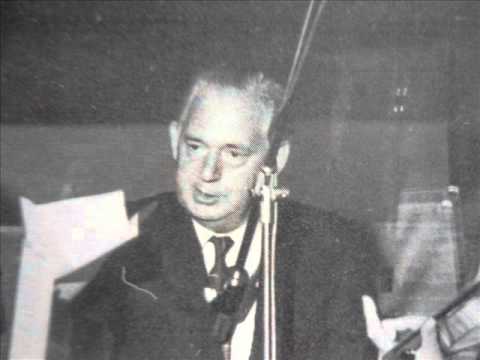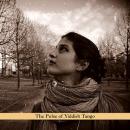דער ייׅד װערט געיאָגט און געפֿלאָגט.
נישט זיכער איז פֿאַר אים יעדער טאָג:
זײַן לעבן איז אַ פֿינסטערע נאַכי
זײַן שטרעבן, אַלץ פֿאַר אים איז פֿאַרמאַכט.
פֿאַרלאָזן, בלױז מיט שׂונאים, קײן פֿרײַנד.
קײן האָפֿענונג, אָן אַ זיכערן הײַנט.
וווּ אַהין זאָל איך גײן?
ווער קען ענטפֿערן מיר?
וווּ אַהין זאָל איך גײן?
אַז ס'איז פֿאַרשלאָסן יעדער טיר.
ס´איז די וועלט גרויס גענוג,
נאָר פֿאַר מיר איז ענג און קליין.
ווי אַ בליק כ´מוז צוריק
ס´איז צעשטערט יעדער בריק
וווּ אַהין זאָל איך גײן?
דאָרט אַהין וועל איך גײן.
אין מײַן לאַנד וואָס איז פֿרײַ
דאָרט אַהין וועל איך גײן
ווי עס אַלץ איז דאָרט נײַ
אַ לאַנד וווּ ײִדישקייט בליט
לעבן ווערט דאָרט פֿרײַ דער ײִד.
ישׂראל איז אונדזער הײם,
דער ײִד לעבט פֿרײַ אין זײַן הײם.
דאָרט אַהין וועל איך גײן.
ישראל אונדזער הײם
דער ייׅד לעבט פֿרײַ אין זײַן הײם
דאָרט אַהין וועל איך גײן
ישראל אונדזער הײם.
נישט זיכער איז פֿאַר אים יעדער טאָג:
זײַן לעבן איז אַ פֿינסטערע נאַכי
זײַן שטרעבן, אַלץ פֿאַר אים איז פֿאַרמאַכט.
פֿאַרלאָזן, בלױז מיט שׂונאים, קײן פֿרײַנד.
קײן האָפֿענונג, אָן אַ זיכערן הײַנט.
וווּ אַהין זאָל איך גײן?
ווער קען ענטפֿערן מיר?
וווּ אַהין זאָל איך גײן?
אַז ס'איז פֿאַרשלאָסן יעדער טיר.
ס´איז די וועלט גרויס גענוג,
נאָר פֿאַר מיר איז ענג און קליין.
ווי אַ בליק כ´מוז צוריק
ס´איז צעשטערט יעדער בריק
וווּ אַהין זאָל איך גײן?
דאָרט אַהין וועל איך גײן.
אין מײַן לאַנד וואָס איז פֿרײַ
דאָרט אַהין וועל איך גײן
ווי עס אַלץ איז דאָרט נײַ
אַ לאַנד וווּ ײִדישקייט בליט
לעבן ווערט דאָרט פֿרײַ דער ײִד.
ישׂראל איז אונדזער הײם,
דער ײִד לעבט פֿרײַ אין זײַן הײם.
דאָרט אַהין וועל איך גײן.
ישראל אונדזער הײם
דער ייׅד לעבט פֿרײַ אין זײַן הײם
דאָרט אַהין וועל איך גײן
ישראל אונדזער הײם.
Contributed by Bartleby + CCG/AWS Staff - 2011/4/22 - 10:38
Language: Yiddish
La trascrizione in caratteri latini.
E' un testo, questo, che ha subito numerose aggiunte e varianti; e "variopinte" sono anche le trascrizioni (quasi tutte incomplete, peraltro) che si trovano in rete. Abbiamo quindi deciso di rifare totalmente anche la trascrizione, in base ai criteri YIVO. [RV]
VU AHIN ZOL IKH GEYN?
Der yid vert geyogd un geflogt
nisht zikher iz far im yeder tog:
lebn iz a finstere nakht,
zayn shtrebn, alts far im iz farmakht.
Farlozn, bloyz mit sonim, keyn fraynd.
Keyn hofenung, on a zikher haynt.
Vu ahin zol ikh geyn?
Ver ken entfern mir?
Vu ahin zol ikh geyn?
Az s'iz farshlosn yede tir.
S'iz di velt groys genug,
nor far mir iz eng un kleyn.
Vi a blik kh'muz tsurik
s'iz tseshtert yeder brik
vu ahin zol ikh geyn?
Dort ahin vel ikh geyn.
In mayn land vos iz fray
dort ahin vel ikh geyn
vi es alts iz dort nay.
A land vu yidishkeyt blit.
Lebn vert dort fray der yid.
Yisroel iz undzer heym,
der yid lebt fray in zayn heym.
Dort ahin vel ikh geyn.
Yisroel undzer heym
der yid lebt fray in zayn heym
dort ahin vel ikh geyn,
Yisroel undzer heym.
Der yid vert geyogd un geflogt
nisht zikher iz far im yeder tog:
lebn iz a finstere nakht,
zayn shtrebn, alts far im iz farmakht.
Farlozn, bloyz mit sonim, keyn fraynd.
Keyn hofenung, on a zikher haynt.
Vu ahin zol ikh geyn?
Ver ken entfern mir?
Vu ahin zol ikh geyn?
Az s'iz farshlosn yede tir.
S'iz di velt groys genug,
nor far mir iz eng un kleyn.
Vi a blik kh'muz tsurik
s'iz tseshtert yeder brik
vu ahin zol ikh geyn?
Dort ahin vel ikh geyn.
In mayn land vos iz fray
dort ahin vel ikh geyn
vi es alts iz dort nay.
A land vu yidishkeyt blit.
Lebn vert dort fray der yid.
Yisroel iz undzer heym,
der yid lebt fray in zayn heym.
Dort ahin vel ikh geyn.
Yisroel undzer heym
der yid lebt fray in zayn heym
dort ahin vel ikh geyn,
Yisroel undzer heym.
Language: Italian
Versione italiana integrale di Riccardo Venturi
26 maggio 2013
26 maggio 2013
Le versioni inglesi come quella presente in questa pagina sono nate per essere cantate ed eseguite, e sono naturalmente degli adattamenti. Sul testo originale yiddish ho quindi condotto questa traduzione pienamente letterale, che copre la "versione completa". [RV]
DOVE DEVO ANDARE?
L'ebreo è perseguitato e torturato,
per lui nessun giorno è sicuro:
la vita è una notte oscura,
i suoi sforzi, tutto per lui è vietato.
Abbandonato, solo nemici, nessun amico.
Nessuna speranza in un domani certo.
Dove devo andare?
Chi mi sa rispondere?
Dove devo andare?
Ché ogni porta è chiusa.
Il mondo è grande a sufficienza,
ma ora per me è piccolo e angusto.
All'improvviso devo tornare indietro,
ogni ponte per me è sbarrato.
Dove devo andare?
Laggiù io devo andare.
Nella mia terra che è libera,
laggiù io devo andare,
laggiù dove tutto è nuovo.
Una terra dove l'ebraismo fiorisce,
là l'ebreo vivrà libero.
Israele è la nostra terra,
l'ebreo vivrà libero nella sua terra.
Laggiù io devo andare.
Israele è la nostra terra,
l'ebreo vive libero nella sua terra
laggiù io andrò,
Israele è la nostra terra.
L'ebreo è perseguitato e torturato,
per lui nessun giorno è sicuro:
la vita è una notte oscura,
i suoi sforzi, tutto per lui è vietato.
Abbandonato, solo nemici, nessun amico.
Nessuna speranza in un domani certo.
Dove devo andare?
Chi mi sa rispondere?
Dove devo andare?
Ché ogni porta è chiusa.
Il mondo è grande a sufficienza,
ma ora per me è piccolo e angusto.
All'improvviso devo tornare indietro,
ogni ponte per me è sbarrato.
Dove devo andare?
Laggiù io devo andare.
Nella mia terra che è libera,
laggiù io devo andare,
laggiù dove tutto è nuovo.
Una terra dove l'ebraismo fiorisce,
là l'ebreo vivrà libero.
Israele è la nostra terra,
l'ebreo vivrà libero nella sua terra.
Laggiù io devo andare.
Israele è la nostra terra,
l'ebreo vive libero nella sua terra
laggiù io andrò,
Israele è la nostra terra.
Language: English
Traduzione inglese della prima strofa trovata qui mentre ritornello e seconda strofa sono quelli della versione di Leo Fuld che tradusse liberamente la canzone dopo averla ascoltata in un caffè di Parigi, eseguita in lingua originale.


Leo Fuld.
WHERE CAN I GO?
The Jew's always hounded and plagued.
Not sure of his hour or his day.
His life is in darkness enclosed.
His strivings are thwarted, opposed.
Deserted, no friends, only foe,
No safe place, no safe day to know.
Tell me, where can I go?
There's no place I can see.
Where to go, where to go?
Every door is closed for me.
To the left, to the right,
It's the same in every land.
There is nowhere to go
And it's me who should know,
Won't you please understand?
Now I know where to go,
Where my folk proudly stand.
Let me go, let me go
To that precious promised land.
No more left no more right.
Lift your head and see the light.
I am proud, can't you see,
For at last I am free:
No more wandering for me.
The Jew's always hounded and plagued.
Not sure of his hour or his day.
His life is in darkness enclosed.
His strivings are thwarted, opposed.
Deserted, no friends, only foe,
No safe place, no safe day to know.
Tell me, where can I go?
There's no place I can see.
Where to go, where to go?
Every door is closed for me.
To the left, to the right,
It's the same in every land.
There is nowhere to go
And it's me who should know,
Won't you please understand?
Now I know where to go,
Where my folk proudly stand.
Let me go, let me go
To that precious promised land.
No more left no more right.
Lift your head and see the light.
I am proud, can't you see,
For at last I am free:
No more wandering for me.
Contributed by Bartleby - 2011/4/22 - 10:39
×
![]()
Note for non-Italian users: Sorry, though the interface of this website is translated into English, most commentaries and biographies are in Italian and/or in other languages like French, German, Spanish, Russian etc.




Testo di Igor S. Korntayer (S. Korn-Teuer)
Musica di Oskar Strok
Lyrics by Igor S. Korntayer (S. Korn-Teuer)
Music by Oskar Strok
Parole di Igor S. Korntayer (1890-1941), poeta ed attore ebreo polacco che visse tra Łódź e Varsavia e finì ucciso dai nazisti ad Auschwitz. La musica era stata composta nei primi anni trenta da Oskar Strok, il "re dell’yiddish tango", e basata sulla melodia di una canzone russa, Голубые глаза [golubye glazá] "Occhi azzurri".
Come altrove specificato in questa pagina, testi della canzone (perlopiù parziali e trascritti in vario modo) si trovano un po' ovunque in rete. Qui presentiamo la versione completa "postbellica".
Una canzone scritta prima della guerra, quando già soffiava forte in Europa il vento infetto dell’antisemitismo, diffusasi poi in molte varianti in tutti i ghetti ebraici, cantata quindi dai sopravvissuti all’Olocausto raccolti nei campi profughi (i D.P.C., “Displaced Persons Camps”), trasformata in seguito in uno degli inni dell’Aliyah Bet, l’immigrazione ebraica in Palestina nel dopoguerra, grande successo americano per il duo yiddish jazz swing delle sorelle Bagelman/Barry, tradotta in inglese da Leo Fuld (1912-1997), celebre cantante neerlandese e grandissimo interprete della tradizione musicale yiddish, che nel 1947 ne fece il suo cavallo di battaglia con milioni di dischi venduti in America e in tutto il mondo, ripresa infine da Ray Charles e Marlena Shaw negli anni 60 per diventare uno degli inni del movimento per i diritti civili degli afroamericani…
Una canzone che ha fatto il giro del mondo subendo mille interpolazioni (che ho cercato faticosamente di sintetizzare) ma senza mai perdere il suo significato profondo di canto di salvezza e di liberazione per l’ebreo errante e per tutti i perseguitati della terra.
La prima strofa - così triste da venir addirittura tralasciata nelle esecuzioni del dopoguerra - ed il ritornello sono quelli originariamente composti da Korntayer, mentre la seconda strofa, che celebra la rinnovata speranza nella terra promessa, fu ovviamente aggiunta più tardi.